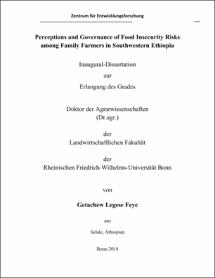Feye, Getachew Legese: Perceptions and Governance of Food Insecurity Risks among Family Farmers in Southwestern Ethiopia. - Bonn, 2018. - Dissertation, Rheinische Friedrich-Wilhelms-Universität Bonn.
Online-Ausgabe in bonndoc: https://nbn-resolving.org/urn:nbn:de:hbz:5n-50422
Online-Ausgabe in bonndoc: https://nbn-resolving.org/urn:nbn:de:hbz:5n-50422
@phdthesis{handle:20.500.11811/7342,
urn: https://nbn-resolving.org/urn:nbn:de:hbz:5n-50422,
author = {{Getachew Legese Feye}},
title = {Perceptions and Governance of Food Insecurity Risks among Family Farmers in Southwestern Ethiopia},
school = {Rheinische Friedrich-Wilhelms-Universität Bonn},
year = 2018,
month = apr,
note = {In Ethiopia, family farming provides livelihood for 81 percent of the population, and accounts for over 96 percent of total agricultural production. However, family farmers often operate under continuous threats of complex sets of risks associated with unfavorable socio-political, ecological, economic, and institutional environments. Consequently, family farming households suffer from structural food insecurity. The major objective of this study, therefore, was to generate empirical evidence on the perception and governance of evolving food insecurity risks among family farming households in Ethiopia. The study was conducted in three woredas (Kersa, Omonada and Bako-Tibe) located in the southwest of the country. Data were collected in May 2015-April 2016 through household surveys, focus group discussions and in-depth interviews. Data analysis followed thematic analysis for qualitative data, and descriptive statistics, principal component analysis, multivariate and ordered probit models for quantitative data. Evolutionary governance theory provided the framework through which to analyze and explain the empirical findings. The results of the study reveal strong path dependencies in land policies, agricultural marketing, and credit policies, and interdependences among these policies putting the food security and livelihood of family farming households at stake. Interdependencies were found between different sources of food insecurity risks, with one exacerbating the effect of the other. Interdependence was also observed in the decisions made in relation to major livelihood strategies in response to food insecurity risks. For instance, crop and livestock production and livestock and off-farm income strategies complemented each other. Moreover, the choice to combine livestock, off-farm, and transfer income strategies increased the choice of crop production strategies. Regarding localized risks, different actors perceived a given risk differently from their own perspectives, forming different ‘riskscapes’, though there could be interdependencies or contradictions among these. In a nutshell, results of the analysis using the evolutionary risk governance framework showed the presence of dependencies in different aspects. It is thus, recommended that design of plans and policies in response to food insecurity risks, consider holistic approaches to understanding the broader perspectives and interconnectedness of different sources of risk. Lessons from past governances should also be taken into consideration, in order not to repeat past failures and instead to develop appropriate and timely interventions against similar risks in the future.},
url = {https://hdl.handle.net/20.500.11811/7342}
}
urn: https://nbn-resolving.org/urn:nbn:de:hbz:5n-50422,
author = {{Getachew Legese Feye}},
title = {Perceptions and Governance of Food Insecurity Risks among Family Farmers in Southwestern Ethiopia},
school = {Rheinische Friedrich-Wilhelms-Universität Bonn},
year = 2018,
month = apr,
note = {In Ethiopia, family farming provides livelihood for 81 percent of the population, and accounts for over 96 percent of total agricultural production. However, family farmers often operate under continuous threats of complex sets of risks associated with unfavorable socio-political, ecological, economic, and institutional environments. Consequently, family farming households suffer from structural food insecurity. The major objective of this study, therefore, was to generate empirical evidence on the perception and governance of evolving food insecurity risks among family farming households in Ethiopia. The study was conducted in three woredas (Kersa, Omonada and Bako-Tibe) located in the southwest of the country. Data were collected in May 2015-April 2016 through household surveys, focus group discussions and in-depth interviews. Data analysis followed thematic analysis for qualitative data, and descriptive statistics, principal component analysis, multivariate and ordered probit models for quantitative data. Evolutionary governance theory provided the framework through which to analyze and explain the empirical findings. The results of the study reveal strong path dependencies in land policies, agricultural marketing, and credit policies, and interdependences among these policies putting the food security and livelihood of family farming households at stake. Interdependencies were found between different sources of food insecurity risks, with one exacerbating the effect of the other. Interdependence was also observed in the decisions made in relation to major livelihood strategies in response to food insecurity risks. For instance, crop and livestock production and livestock and off-farm income strategies complemented each other. Moreover, the choice to combine livestock, off-farm, and transfer income strategies increased the choice of crop production strategies. Regarding localized risks, different actors perceived a given risk differently from their own perspectives, forming different ‘riskscapes’, though there could be interdependencies or contradictions among these. In a nutshell, results of the analysis using the evolutionary risk governance framework showed the presence of dependencies in different aspects. It is thus, recommended that design of plans and policies in response to food insecurity risks, consider holistic approaches to understanding the broader perspectives and interconnectedness of different sources of risk. Lessons from past governances should also be taken into consideration, in order not to repeat past failures and instead to develop appropriate and timely interventions against similar risks in the future.},
url = {https://hdl.handle.net/20.500.11811/7342}
}






